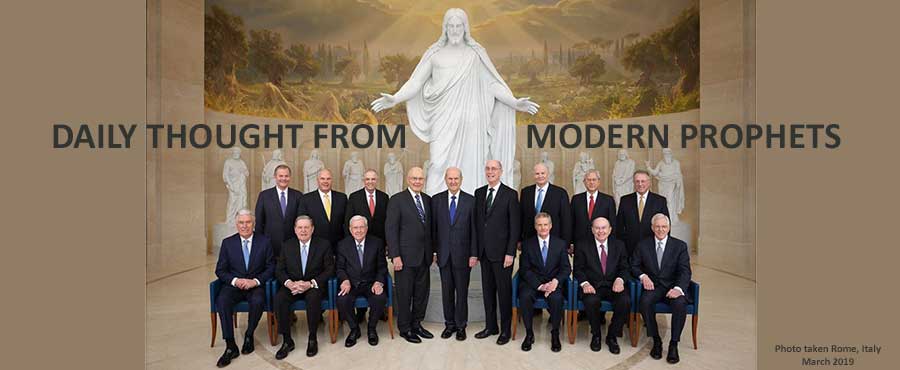"Christ's great gift to us was his life and sacrifice—should that not then be our small gift to him—our lives and sacrifices, not only now, but in the future? ...
"Yes, men and women who turn their lives over to God will find out that he can make a lot more out of their lives than they can. He will deepen their joys, expand their vision, quicken their minds, strengthen their muscles, lift their spirits, multiply their blessings, increase their opportunities, comfort their souls, raise up friends, and pour out peace. Whoever will lose his life to God will find he has eternal life....
"God loves us, he's watching us, he wants us to succeed, and we'll know someday that he has not left one thing undone for the eternal welfare of each of us. If we only knew that there are heavenly hosts pulling for us—friends in heaven, whom we can't remember now, who yearn for our victory. This is our day to show what we can do—what life and sacrifice we can daily, hourly, instantly bring to God. If we give our all, we will get his all from the greatest of all."
- Ezra Taft Benson, "Jesus Christ—Gifts and Expectations," BYU devotional, 10 December 1974; see also Ensign, December 1988, pp. 2-6
Click here to read the full talk at the BYU siteClick here to read the full talk from the Ensign
I think this was one of President Benson's most remarkable and insightful addresses, given originally at a BYU devotional. As Christmas approached in 1974, he spoke tenderly of his love for the Savior and of the gifts He gave us (and continues to give us), as well as gifts we might give in return and the blessings that would follow. One of the most significant gifts we can give is to "turn [our] lives over to God," and then discover what He can give in return:
That's quite an impressive list of blessings and benefits to come to us!
I love the witness of this final testimony; we will some day realize "He has not left one thing undone for the eternal welfare of each of us." He truly will do everything He can to help us succeed eternally, if we will allow Him into our lives.
(Compilation and commentary by David Kenison, Orem, Utah, 2022)
July 9, 2016
July 9, 2016




































